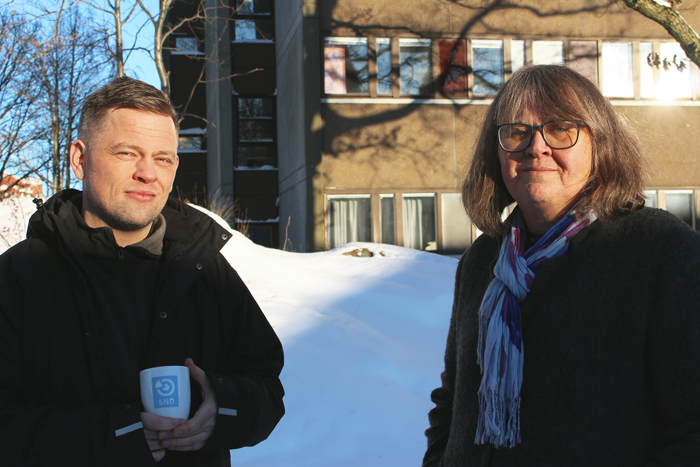
One of the staff responsible for the visit was Iris Alfredsson, SND’s contact for DATICE.
Despite the difference in size and conditions in Iceland and Sweden, the similarities outweigh the differences in their respective work with making research data accessible. The FAIR principles, researchers’ needs for efficient tools, long-term funding of research infrastructures, and how to manage research materials with personal data are just some of the questions that are high up on the agenda for both countries.
Last week, SND had a visitor from the Icelandic data repository DATICE, located at the University of Iceland. The idea to build a repository has been there since 2013, but it was only at the end of 2018 that the operations began. For the past two years, Örnólfur Thorlacius has been responsible for DATICE and their efforts to make Icelandic social science research data more accessible.
—Our operations have begun to really develop this last year. We’ve got our own Dataverse system for data descriptions, we’ve migrated all datasets to Dataverse, we’ve had staff working with data management, and have also started working on the Icelandic version of ELSST, a thesaurus for the social sciences, says Örnólfur.
Learning from other Nordic countries
Since 2019, DATICE is also a so-called Service Provider in the European research infrastructure CESSDA. Through the CESSDA Mentorship Program 2021–2022, SND has become mentor for the Icelandic repository. The program will also include tailor-made Dataverse training, provided by the Dutch repository DANS.
Örnólfur Thorlacius hopes that his visit to SND will give him new ideas and experiences that can be useful for the continued development of DATICE in Iceland.
—As in many other areas, it’s good to see how the other Nordic countries approach similar issues. We think that SND’s model of a national network of collaborating HEIs could be used in Iceland as well. We’re also interested in how SND works with training, communication, and with research data from a variety of scientific disciplines. So far, we only have quantitative data from the social sciences, but we have started working with the education sciences and hope to serve other research fields as well in the future, says Örnólfur.
Similar challenges in Sweden and Iceland
Örnólfur Thorlacius mentions that DATICE is the only Icelandic repository that complies with the FAIR principles, and their efforts to gain a CoreTrustSeal certification are in full speed. One of the most important questions ahead is to also keep developing user-friendly tools that will make it easier for Icelandic researchers to submit data for reuse.
The challenges that face the Icelandic work with open research data are similar to what we see in Sweden. One problem is the lack of long-term funding for research infrastructures, another the difficulties in achieving secure access to sensitive data, such as data that contain personal information.
—In Iceland, open access to scientific results has, so far, only been about open access to scientific articles. One of our main goals has been to be a driving force in making this question also concern open access to research data. Here we are beginning to see results; several stakeholders are interested in working with us, for instance Statistics Iceland, the Directorate of Education, and the other Icelandic universities.
What important knowledge have you gained during your visit to Sweden?
One of the hands-on advice that Örnólfur Thorlacius takes back from his visit to Sweden is to work with handbooks and guides, such as the wiki that SND has developed for the SND network.
—Another important lesson, which was a real eye-opener to me, is how closely SND works with the university libraries. We could certainly show more interest and work harder there, as the Icelandic libraries also hold a lot of competence in open science, and they are used to working with open publication of scientific articles, says Örnólfur.